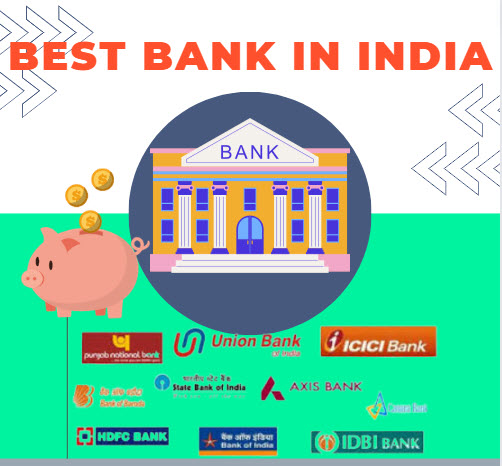In the ever-evolving realm of Indian banking, 2023 brings with it a fresh perspective on the institutions that stand out as the best in the business. The banking sector in India has undergone significant transformations over the years, fueled by technological advancements, regulatory changes, and shifting customer preferences. As we delve into the year 2023, it's a fitting time to evaluate the banks that have managed to stay ahead of the curve and provide exceptional services to their customers.
The Criteria for Excellence
Determining the best banks in India involves a holistic assessment of various factors. Some of the key criteria include:
- Financial Performance: A strong financial foundation is a fundamental requirement for any bank aiming to be the best. Parameters like profitability, asset quality, capital adequacy, and growth trajectory play a crucial role in this assessment.
- Innovation and Technology: The adoption of cutting-edge technology, including mobile banking, digital payment solutions, and AI-driven customer service, has become a hallmark of the best banks. These innovations enhance customer experience and streamline banking operations.
- Customer Service: Customer-centricity remains paramount. Banks that offer excellent customer service, personalized solutions, and swift grievance redressal tend to stand out from the competition.
- Product Portfolio: A diverse range of banking and financial products, including savings accounts, loans, investment options, and insurance, cater to various customer needs. The best banks curate their product offerings to address a wide spectrum of requirements.
- Regulatory Compliance: Adherence to regulatory guidelines and ethical practices ensures the stability and credibility of a bank. The best banks consistently maintain a strong compliance record.
The Best Banks in India for 2023
In an era marked by rapid technological evolution, regulatory changes, and shifting consumer preferences, these 10 banks exhibit the qualities necessary to be the best in India. By embracing innovation, customer-centricity, and financial stability, they not only navigate the complex currents of the banking industry but also set benchmarks for excellence that will shape the sector's future. Based on these criteria, several banks have managed to shine through in 2023:
1. State Bank of India (SBI)
As one of the oldest and largest banks in India, SBI continues to be a dominant force in the banking landscape. With a vast network of branches and ATMs across the country, SBI offers a comprehensive range of services. The bank's commitment to technological innovation is evident in its user-friendly mobile app, digital banking solutions, and AI-powered chatbots that assist customers 24/7.
2. HDFC Bank
HDFC Bank consistently ranks among India's best banks due to its unwavering focus on customer satisfaction. The bank's digital initiatives have propelled it to the forefront of the industry. From instant loan approvals to feature-rich mobile banking, HDFC Bank embraces technology to simplify banking for its customers.
3. ICICI Bank
ICICI Bank's customer-centric approach and innovative spirit have earned it a spot among the top banks. Its range of banking products, coupled with a commitment to adopting advanced technology, positions it as a frontrunner in the industry. The bank's efforts in providing accessible and efficient digital banking services have significantly contributed to its popularity.
4. Kotak Mahindra Bank
Kotak Mahindra Bank's agility and adaptability have been central to its success. The bank's emphasis on tailor-made financial solutions, combined with its foray into digital banking, has attracted a substantial customer base. Its initiatives in wealth management and investment advisory further elevate its standing.
5. Axis Bank
Axis Bank's consistent growth and strategic expansion have secured its position as one of India's best banks. The bank's digital prowess is evident in its online trading platforms, mobile banking apps, and the seamless integration of various financial services. Axis Bank's commitment to transparency and customer trust remains commendable.
6. Punjab National Bank (PNB)
PNB's enduring legacy combines with contemporary strategies to secure its place in the top 10. Its dedication to financial inclusion and technological adoption has expanded its reach. PNB's commitment to fostering innovation and enhancing customer experiences underscores its significance in the Indian banking landscape.
7. Bank of Baroda
Bank of Baroda's global presence and diversified services underline its resilience. By embracing digital advancements, the bank ensures seamless international transactions and comprehensive digital banking services. Its emphasis on financial literacy and community engagement adds a dimension of social responsibility.
8. Canara Bank
Canara Bank's customer-centric approach and innovative products resonate with a broad spectrum of customers. The bank's emphasis on corporate social responsibility and sustainable practices reflects a holistic vision. Its commitment to nurturing financial growth in both urban and rural areas sets it apart.
9. IndusInd Bank
IndusInd Bank's rise to prominence is characterized by its innovative spirit. The bank's tech-driven solutions, personalized offerings, and quick service turnaround demonstrate a deep understanding of customer needs. IndusInd's nimble approach positions it as a dynamic player in the competitive banking arena.
10. Union Bank of India
Union Bank of India rounds off the top 10 with its consistent dedication to modernization. The bank's digital push, coupled with its focus on accessibility and inclusivity, solidifies its reputation. Its contribution to financial empowerment in rural communities highlights its commitment to national progress.
Summary: The Top 10 Banks in India for 2023
2023 unveils a distinguished list of the top 10 banks in India, exemplifying excellence in the nation's banking sector. These banks stand out as leaders due to their stellar financial performance, unwavering commitment to customer satisfaction, and pioneering technological innovations. With their extensive service portfolios, expansive branch networks, and state-of-the-art digital solutions, they effectively address the diverse requirements of individuals, businesses, and government entities.
Furthermore, these banks play an active role in promoting financial inclusion, generating employment opportunities, and contributing to India's economic advancement. As we delve into this overview of India's top 10 banks for 2023, it becomes clear that they are not merely financial institutions but also pivotal drivers of progress and prosperity within the nation.
|
Rank |
Bank Name |
Net Profit 2022 (Rs. Cr.) |
Net Profit 2023 (Rs. Cr.) |
|
1 |
State Bank of India (SBI) |
43,775 |
56,558 |
|
2 |
HDFC Bank |
38,150 |
46,149 |
|
3 |
ICICI Bank |
25,784 |
34,463 |
|
4 |
Punjab National Bank (PNB) |
3,676 |
3,069 |
|
5 |
Bank of Baroda (BoB) |
7,900 |
14,700 |
|
6 |
Axis Bank |
14,168 |
23,342 |
|
7 |
Canara Bank |
7,200 |
10,800 |
|
8 |
Union Bank of India |
5,209 |
8,400 |
|
9 |
Bank of India (BOI) |
3,300 |
3,550 |
|
10 |
IndusInd Bank |
4,805 |
7,443
|
Embracing the Future
In a world characterized by rapid technological advancements and evolving customer preferences, the best banks in India are those that proactively embrace change. They view challenges as opportunities, leveraging technology to enhance customer experiences, streamline operations, and maintain their financial robustness. As we navigate the intricacies of the financial landscape in 2023 and beyond, these top banks serve as guiding beacons of excellence in the Indian banking sector.
Conclusion
The elite top 10 banks in India for the year 2023 have solidified their roles as cornerstones of the nation's financial ecosystem. Through their exceptional financial performance, unwavering commitment to customer satisfaction, and pioneering advancements in technology, these banks have displayed an unwavering dedication to excellence. Their comprehensive array of services has adeptly addressed the multifaceted needs of individuals, businesses, and governmental bodies alike.
A significant contributor to India's economic expansion, these banks have actively fostered financial inclusion, nurtured job opportunities, and provided crucial support across sectors. Their proactive embrace of digital transformation has not only elevated customer convenience but has also widened the accessibility of banking services. As the Indian banking landscape continues to evolve, these top 10 banks are poised to steer the course, shaping the trajectory of banking in the country.
With their resolute commitment to setting new standards, they are poised to play a pivotal role in propelling India's financial growth and prosperity in the years ahead.
Frequently Asked Questions
The State Bank of India (SBI) holds the title of India's no. 1 bank, boasting the largest size, customer base, and overall market presence.
The State Bank of India (SBI) is the largest bank in India, leading in terms of assets, branches, and customer base. As the largest public sector bank, it plays a pivotal role.
Presently, India has 12 nationalized banks. These banks have been brought under government ownership and control to ensure public welfare and economic stability.
The State Bank of India (SBI) stands as the largest public sector bank in India. Its expansive branch network and diverse financial products and services contribute to its prominence.
Holding this distinction, HDFC Bank leads as the largest private sector bank in India. Its strong financial performance, customer-centric approach, and innovative digital solutions have propelled its growth and prominence.
The Reserve Bank of India (RBI) oversees the safety of banks in India. Noteworthy for their stability and safety measures are banks like the State Bank of India (SBI), HDFC Bank, ICICI Bank, and Punjab National Bank (PNB).
India boasts various types of banks, encompassing public sector, private sector, cooperative, foreign, and regional rural banks. These distinct categories cater to the diverse financial needs of individuals, businesses, and the broader economy.


















Comments